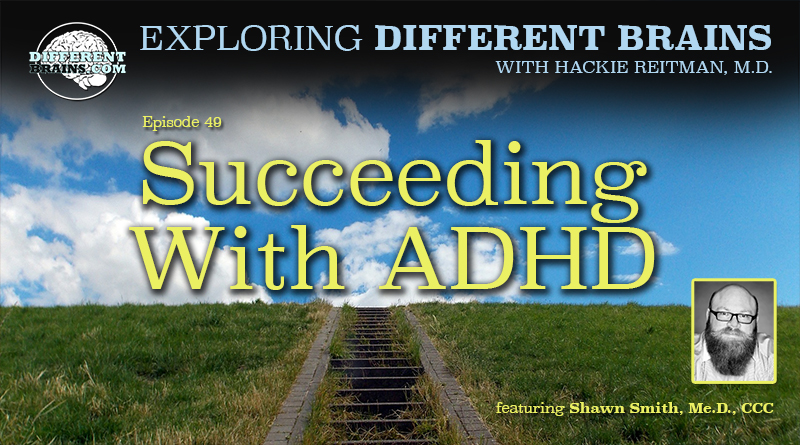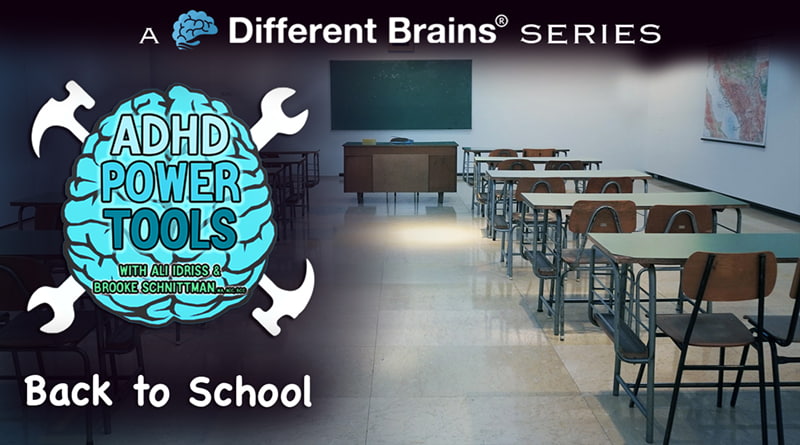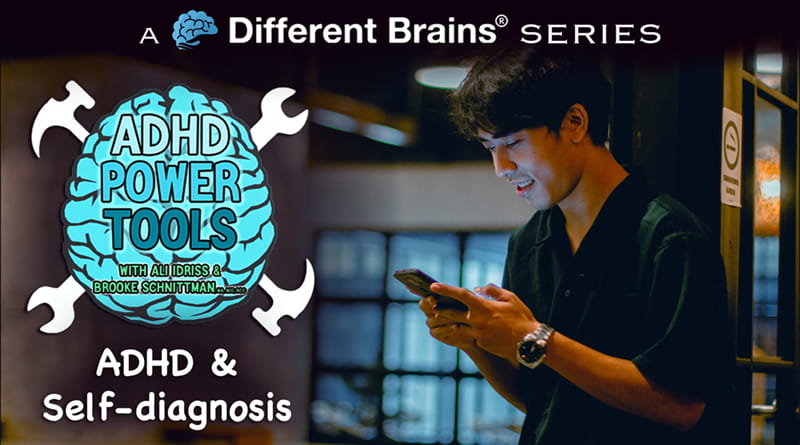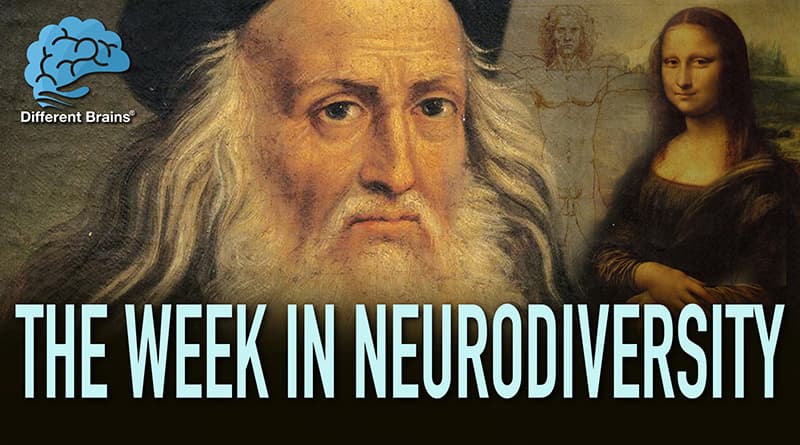
Succeeding With ADHD: Maximizing the Abilities of Neurodiversity, with Shawn Smith | EDB 49
In this episode, Harold Reitman, M.D. speaks with returning guest Shawn Smith, of Don’t dis-my-ability. Shawn discusses his diagnoses of ADHD, how he started his own organization, and the importance of self-advocacy. He also talks about how he didn’t learn to count until the age of 24, while working as a blackjack dealer.
For more about Shawn and Don’t Dis-my-Ability, visit: www.ddmacs.ca
Also, check out the video blogs Shawn has contributed to this site: http://differentbrains.com/author/shawn-smith-m-ed-ccc/
35 Second Preview:
To listen or download the podcast version of this episode, see the embedded player below.
Or look for us on your favorite podcast provider:
iTunes | Stitcher | SoundCloud
[expand title=”View Full Transcript”]
HACKIE REITMAN (HR): Hi this is Dr. Hackie Reitman, welcome to another edition of exploring different brains. Today my friend Shawn Smith is in from Canada, he’s the found of Don’t Diss My Ability. When you get a load of this guy you don’t want to get on his bad list. Shawn welcome, you’re returning but I’m going to do the whole introduction again.
SHAWN SMITH (SS): Alright!
HR: Well your story is very interesting, why don’t you introduce yourself to whoever is watching this and seeing you for the first time.
SS: Sure, Shawn Smith founder of Don’t Diss My Ability. Unique story in the way that I identify as being neurodiverse and I specialize as a counselor and psychotherapist in the field of neurodiversity. I was undiagnosed with ADHD until age 30. It took me four years to finish three years of high school. 32 attempts during 18 credits required to graduate including failing grade 10 math four times. Trudging my way through and then started taking medication when I was diagnosed at age 30 and it gave my brain the jump start it needed and it kind of took my brain from dial up to fiber opt and I went from the bottom of the class to the top. Kind of battling my way through different social policies. I was disabled but not quite disabled enough. So I started challenging social policy and kind of just getting my bearings and realizing that when people say that the system is broken it implies that it was intended to work in the first place and the research that I’ve done shows explicitly that it’s not. So I’ve just kept battling and was finally, I got into the masters education and counseling psychology program at UNB. I was admitted on academic probation and I graduated less than a year later at the top of my class.
HR: You were a young, young little kid of 24 years old when you learned how to count.
SS: Yeah, I used to go around with pocket change and I couldn’t count it. There could be any type of stimuli lights or sound and that’s being part of neurodiverse that we feel and sense things more deeply than others. I kind of describe my life as living in a haze. So I would go start to count the change then there would be some type of stimuli and it was like someone erased the process from my memory, to the point I’d get so pissed off that I would just put it back in my pocket and walk away. At the ripe age of 24, my girlfriend at the time, now my wife, we decided to move to Lake Tahoe of all places and I ended up getting a job as a blackjack dealer, that I did not want. But because there are so many people and immigrants that migrate there every summer to account for the tourist season, I was the English speaking Canuck. So they really were hounding me to do it. I’m so thankful that I did because I had some tactile to manipulate with my hands, then I could do it in my head. But I didn’t have a framework to conceptualize what people were asking me to count. So once I had that I was able to do math in my head really really quickly. When someone comes into my office and they disclose whether its ADHD, Asperger’s, Autism Spectrum Disorder, fetal alcohol spectrum disorder. One of the things I say to them is welcome to the world of the uniquely gifted, because I see it in myself and the work that I’m doing with these individuals and the success that we’re having.
HR: Welcome to the world of the uniquely gifted. Well Said. So what inspired you to start your own organization? How did that happen?
SS: I got really pissed off. When I would go back to a school and I’m bilingual, which in Canada is an asset to speak both official languages, I had a university degree, I had a diagnosis, so I thought ok I’m going to get one of these cushy government jobs that everyone talks about. So I enrolled in our version of affirmative action. And I can’t tell you how many jobs I applied for but I can tell you how many interviews I had. None. So when I went back to upgrade I started, I had to take 5 courses as a mature student. And they’ll take that new GPA over your old one. So I went to a 2.3 in my undergrad to a 3.7. I used those 5 courses to really dig into that program and so I just started writing letters to our government through the right to information act, where they have to respond. I realized it wasn’t me, I’m awesome, it’s the program. So the 25-year history of that program it had never been audited, no one had ever asked the questions that I asked.
I wrote one paper for two classes worth 100% of my entire grade and got 2 As for my work. So realizing that, I was also a new dad, when all this happened and I’m realizing what kind of person do I want to be, am I the type of person who can look the other way and pretend it didn’t happen? I couldn’t do that. So it just fueled my fire in what started off as people, even my wife saying the government wouldn’t do that or the school wouldn’t do that, calling me kind of a conspiracy theorist. Well it turned out to be true, and the school where I did my undergrad, I don’t talk about them because I don’t want to publicize their name. When I went back to upgrade I was discriminated against twice and filed two separate human rights complaints against them. So in their affirmative action policy, for new applicants, at the time they only recognized in their language, blacks, aboriginals, and persons with physical disabilities. Leaving out people with mental disabilities or disorders. So I filled two separate human rights complaints because the first time I applied I ticked off the other box and put ADHD and they refused to recognize it. So in my human rights complaints, by naming certain visible minorities they are therefore discriminating against all others.
So I tried to work with the university to pitch a collaborative, more inclusive policy and they hired a huge law firm to take me on over the course of 2 years while I was doing my masters degree, while my wife was in the program that I was advocating against, and had two small children. So I don’t like to get got, you know there is something about knowing you’re intrinsically in what you’re doing and I couldn’t let it go so I just kept doing it.
HR: Now is that part of the attraction of your wife to you? That you were a pain in the butt?
SS: No not at all, that’s interesting too Hackie because I was a different person, I really was, it was night and day. I would say before I was diagnosed and became part of the disabled community I wouldn’t say that I was a bigot or things that I find funny I no longer find funny now and it was really a shift for me. Part of it was being up north in Canada. Like way up in the Northwest Territories and seeing the suicide rate for gay lesbian and transgender community. My son was going to be born and coming to this kind of epiphany, does it matter if my son is potentially gay? I just want my son and I want him to be happy. Nothing else mattered. I had this ah ha moment I got goose bumps, you know were all people. That’s all that matters is that people are happy. Whatever lifestyle whoever they are or choose to be, what matters is they’re happy.
HR: Here in the United States, back when I was chairmen of the boys and girls clubs of Broward County here, the boy scouts had come under scrutiny and it was a heavy heavy amount of criticism on both sides. Because they had decided they were not going to allow gay leaders. I was being asked as chairmen here what was the stance of the boys and girls club? I said it’s real easy, we don’t discriminate. What does that mean? It means we don’t discriminate. Pick a category, we don’t. If someone is not doing their job or someone is doing the wrong thing then we’ll throw them out.
SS: Just like anyone else, people would have already been hired, people in the organization may not have known.
HR: It’s very very interesting. And it’s great that you’re a fighter, now did a lot of that fighting spirit come from football or cause you to go into football. And tell us about your football career.
SS: Sure, It’s so strange to think back Hackie, because I played golf and hockey all of my life and I never got any better. To grow up playing two sports like that and to watch my peers’ progress and get better, I got bigger but I didn’t get better. My first year of grade 12 a friend convinced me to try out for our high school football team and we were a powerhouse. Our was school was the largest high school in the British Common Wealth with 3000 kids. It was a big school. So I tried out and I made the team.
First year I didn’t play a whole lot, my second year I was an all-star. As an all-star you get packages from all major Canadian universities with a football team. I remember getting a call down to the principal’s office, and it was a good one, I went down, I got all the packages, I felt like a peacock strutting my way back. But then I open them one after another I just slipped further into a depression, I couldn’t go to any of these schools. For the first time ever, a college from Quebec, decided to recruit out of province, so the head registrar was also the defensive coordinator snuck me in. I didn’t have the grades to get in, but they snuck me in. I went to summer school every summer, I found out 2 weeks before training camp started that I actually graduated from high school and was going to be moving to Montreal to go to school which just seemed so foreign to me. I mean I was transplanted from a small place into this huge urban center.
So it was a bit of a culture shock but one of the things that my coaches would say is there are two in particular, Coach Lou Chapman and Coach Dennis Wade, who they don’t subscribe to the dumb jock, you have to be smart to play this sport, and you do, you really do. It kind of ingrained in me that you really have to think and they kind of instilled that in me even. I was starting to see more success academically. It was odd to me because under my parent’s roof I couldn’t do anything. Then I had all this freedom and I was doing better. But I also go to pick the courses that I wanted to take, so that made a difference but it was really being accountable to the football team. If you missed class, we had the honor system, we did this thing called a big 3. So after practice, after sprints, after all the other stuff, if you didn’t go to class, they were going to know. They just had to ask around. So we had to do this thing called the big three. When practice was done you had to crawl, one length of the field, do it backward on the way back, and then sprint back. So it was not worth it to not attend class, practice was hard enough, I didn’t need that. The odd time that I did miss class, I made a point of doing it, because it was a good lesson, don’t do that again.
HR: Well the psychological aspects of training in sports and good coaches can make a tremendous difference just as a great teacher can. Of course a great parent, I bet you’re a great parent. How old are your little ones?
SS: 8 and 6. I love it.
HR: What’s their story, what are they like?
SS: My son is really into Pokémon and he’s a reader, I mean we went to the library last week and he took out 22 books. And over the weekend I think he read about 5 or 6. He’s just reads like nobodies business. He’s smart as a whip. My daughter is 6. We didn’t teach her to print or add or subtract, he did all that. So it’s just phenomenal to kind of sit back and watch that unfold. One of the cool things, my wife and I have had a lot of shared experiences together like for many many years we worked together in a therapeutic environment so before we had out own kids we worked for a company called Spurwink in Maine. And we were therapeutic foster parents for the Casco program, which was primarily at risk youth. It was so worthwhile to do it, so there isn’t a whole lot of stuff my kids are going to pull we haven’t already dealt with. So it’s kind of nice that way.
HR: I like how you named your organization, point to your shirt there, Don’t Diss My Ability. How did you get at that?
SS: When I started taking medication Hackie, things started happening in my brain. The best way for me to describe it, if you can think of an old antique truck, that you find in an old barn, you want to get it going again so you change the gas, the oil, you pop the hood and you start it up. You can see it starts to rumble, and you can see the flakes of rust chip and fall off. That’s what happened in my head. There was one night, I was on an overnight watch of one of the residents up North and I couldn’t sleep, my responsibility was to ensure his safety, so his door was open, I had to keep eyes on him at all times. But things were just flowing in my head and I listen to a lot of different music I just had this rap beat in my head, I actually wrote a rap song called don’t diss my ability. That’s how it came to be.
HR: How does our audience get in touch with you?
SS: I’m on Facebook, I’ve got everything going, any type of social media you can think of, I’m on twitter, I’m on instagram, Facebook, YouTube channel, and of course contributing blogger for Different Brains, so if anyone really wants to know where to find me they can hit up your website if they’re not able to find me through Google.
HR: What’s your website?
SS: DDMACS.CA
HR: Shawn can you tell us from your perspective, why is self-advocacy so important?
SS: It empowers people. I’ve realized that the only person I can really count on is me. As much support as I get from other people am I’m the only person who can make or break me. If I’m not battling for what I feel is right, then who else is going to do that for me? Although there have been a lot of organizations that claim to advocate for others, what I found is that they do do that but it’s also about self-preservation. I’m very transparent in what I do so for me it’s not enough to say that I’m doing it, I want to actively be doing it and making a change. There is no smoke screen, I am who I am, what you see is what you get. So it’s really about being transparent and staying true to who I am, in the last month and a half I’ve had 2 non-profits come back and apologize to me for dismissing me when I reached out to them from last year. I have this saying, ” I won’t wait for anyone, catch me now or catch me later, but I’m not going to stick around.” So it’s part of realizing that I’m the one who is in control and one of my best friends and advisors Gene Fowler who owns Loogaroo Animation, really helped me to see that although my business is located where we are a local area, that doesn’t mean that my business has to be local. So he helped me to see a global perspective. Counseling is one aspect of what I do, but because I have ADHD, I also have a very good understanding of how my thought process works. So I know I can’t do the same thing all day every day, I’d get bored then I’d get resentful. So I intentionally try to partner with creative organizations and work on these really amazing projects.
HR: What’s the biggest single thing about what you do that someone in our audience would have no idea and it would surprise them. If you can think of anything what might that be?
SS: A lot of parents come to me and they think, I’m going to work with their kids. And probably 95% of the time I work with the parents. The kid is awesome; it’s the world in which we live in and how things are framed. So an example would be, a parent would come to me and say, my kid is isolating and spending a lot of time watching TV or on their electronics. So I reframe that for them, if 90% of your day consisted of being told what your doing is wrong would you want to spend time with you? And that’s just the honest way of framing it. From the time that kid goes to school from the time he goes to bed, parents are asking them to do this that or the other thing and so are the teachers. So no matter where they go they’re being crapped on. I’m not perfect, but it’s something I use in my own life, that I try to be mindful of with my kids. What percent am I at today? To be mindful of that because if we’re not what type of parent or guardian are we being? So I don’t subscribe to an authoritative type of approach I try not to. A lot of it has to do with natural consequences and helping parents set up a framework so it’s not them punishing their child it’s their child choosing the behavior therefore choosing the consequence that goes with that behavior. But helping people to kind of frame that up.
HR: Well listen, I’m so glad you’re visiting us in Fort Lauderdale from Canada. You’ve really been an inspiration to us because you got that Jersey City attitude, I think you and I both have a little bit of authority problems. I love your story, I love what you’re doing for people, I love that you’re a good family man, and that you’re going out of your way to fight for those of us whose brains are a little bit different. So Shawn Smith thank you for being on Exploring Different Brains.
SS: Anytime Hackie. Love doing it. Anytime.
[/expand]
This video is owned by Different Brains Inc, kindly donated by it’s original producer PCE Media LLC.
Different Brains® Inc. founder Harold “Hackie” Reitman, M.D. is an author, filmmaker, retired orthopedic surgeon, former professional heavyweight boxer, the past chairman and president (and current board member) of The Boys and Girls Clubs of Broward County, and a neurodiversity advocate. However, it was his role as a father that led to the creation of the DifferentBrains.org website.
Hackie’s daughter Rebecca grew up with epilepsy, 23 vascular brains tumors, and underwent 2 brain surgeries before the age of 5. Her struggles and recovery put him on the road to, through 26 professional heavyweight boxing matches, raising money for children’s charities (to which he donated every fight purse).
Rebecca eventually went on to graduate from Georgia Tech with a degree in Discrete Mathematics, and Dr. Reitman wrote and produced a film based on her experiences there (The Square Root of 2, starring Darby Stanchfield of ABC’s Scandal). After graduation, Rebecca received a diagnosis of Asperger’s syndrome. Hackie, shocked at his own ignorance of the topic despite being an M.D., embarked on years of research that culminated with his book Aspertools: The Practical Guide for Understanding and Embracing Asperger’s, Autism Spectrum Disorders, and Neurodiversity (released by HCI books, publishers of the Chicken Soup for the Soul series).
This experience revealed to Hackie the interconnectedness of the conditions that fall under the neurodiversity umbrella, while alerting him to the in-fighting and fractured relations that often plague the organizations tasked with serving the community. Convinced that overcoming these schisms could help all of society, Hackie forged the Different Brains philosophy of inclusive advocacy: “Supporting Neurodiversity – From Autism to Alzheimer’s and All Brains In Between”.
In the company’s initial years of operation, Hackie self-financed all of the content on DifferentBrains.org, all of which offered free to view to the public. Currently he is the host of our weekly interview show Exploring Different Brains, writes blogs for the site, and tours the country speaking at conferences, conventions and private functions, all with the goal of improving the lives of neurodiverse individuals and their families, and maximizing the potential of those with different brains. Separate from Different Brains, Hackie is the founder and CEO of PCE Media, a media production company focusing on reality based content. He recently co-executive produced the documentary “Foreman”, the definitive feature documentary on legendary boxer and pitchman George Foreman.




